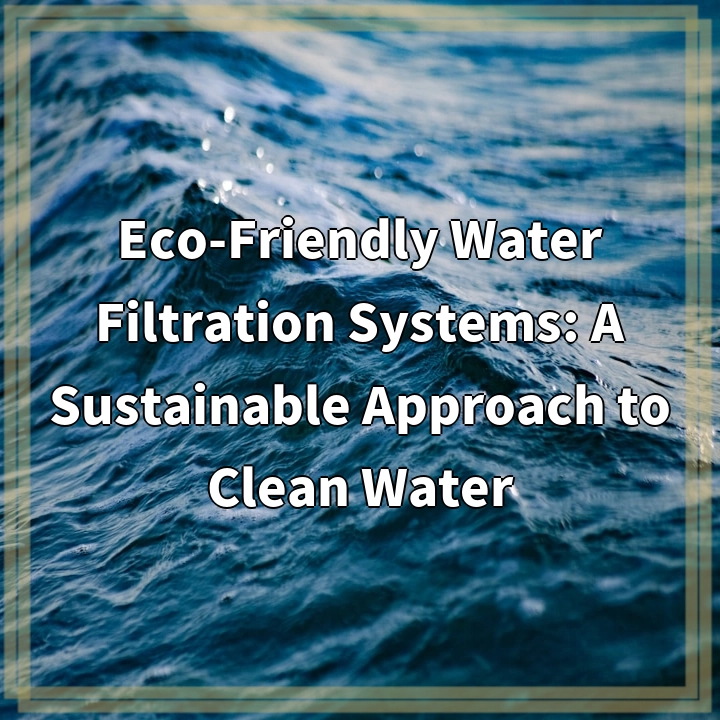
What it is:
Eco-friendly water filtration systems are innovative solutions designed to purify water using sustainable methods that minimize environmental impact. These systems often utilize natural materials, such as activated charcoal, sand, and ceramic, to remove impurities from water, making it safe for consumption. Unlike traditional filtration systems that rely heavily on electricity and synthetic chemicals, eco-friendly options emphasize energy efficiency and reliance on renewable resources.
Key Components of Eco-Friendly Water Filtration Systems
1. **Natural Filtration Media**: Many eco-friendly systems use materials like sand, gravel, and charcoal to filter pollutants and contaminants. These substances are not only effective but also sustainable and non-toxic.
2. **Solar Power Integration**: Some advanced filtering systems harness solar energy to power pumps and other mechanisms, reducing reliance on fossil fuels and decreasing carbon footprints.
3. **Gravity-Driven Systems**: Many eco-friendly filtration methods operate using gravity, which eliminates the need for electricity. These systems can be particularly useful in remote or off-grid locations.
Real-World Problems
Despite their benefits, eco-friendly water filtration systems face several real-world challenges and limitations that need to be addressed.
1. Access to Technology
In many developing regions, access to eco-friendly filtration systems can be limited. Not everyone has the financial means to invest in these systems, even if they are more sustainable in the long run. This creates a disparity in access to clean water.
2. Maintenance and Longevity
Most eco-friendly systems require regular maintenance to function effectively. Users may need to replace filtration media periodically, and if individuals lack the knowledge or resources to perform this maintenance, water quality can diminish over time.
3. Effectiveness Against All Contaminants
While eco-friendly systems can be highly effective in removing many types of contaminants, they may not be sufficient for certain hazardous substances, such as heavy metals or viruses, which require specialized filtration technologies. This can create a false sense of security among users who rely solely on these systems.
4. Environmental Factors
In areas where water sources are heavily contaminated, even eco-friendly filtration systems may struggle to provide adequate purification. Seasonal changes, such as heavy rain or drought, can also affect the quality of water and the system’s performance.
5. Awareness and Education
Many potential users are unaware of the benefits of eco-friendly filtration systems. Increased education on the importance of sustainable water practices and how these systems work can drive adoption and improve public health outcomes.

Solutions for Eco-Friendly Water Filtration Systems
Addressing the challenges associated with eco-friendly water filtration systems requires a multi-faceted approach. The following solutions can enhance access, effectiveness, and sustainability in providing clean water.
1. Increasing Accessibility
To bridge the gap in access to eco-friendly water filtration systems, initiatives such as subsidized programs and community-based projects can be developed. Non-governmental organizations (NGOs) and local governments can collaborate to provide these systems at reduced costs or even for free in underserved areas.
2. Promoting Maintenance Education
Regular maintenance is crucial for the longevity of filtration systems. Providing educational workshops or informative resources on how to properly maintain and replace filtration materials can empower users, ensuring their systems operate effectively for longer periods.
3. Enhancing Effectiveness
Developing hybrid systems that combine eco-friendly methods with advanced technologies can improve the efficacy of filtration against a broader range of contaminants. Research into new materials and techniques can also enhance the purification capabilities of eco-friendly systems.
4. Adaptation to Environmental Changes
Implementing adaptive management strategies can help eco-friendly filtration systems respond to environmental fluctuations. Regular monitoring of water quality and maintenance schedules can ensure systems are prepared for seasonal changes and extreme weather events.
5. Raising Awareness and Education
Enhancing public awareness through campaigns and educational programs can inform communities about the advantages of eco-friendly water filtration systems. Increasing knowledge of sustainable water practices can encourage individuals to adopt these solutions and advocate for cleaner water sources.















